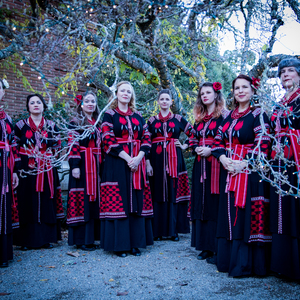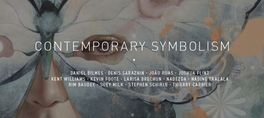The Bay Area women’s vocal ensemble Kitka has been thoughtfully researching and reinventing traditional songs from Eastern Europe and Eurasia for four decades. Kitka’s song-catching adventures in regions spanning Transylvania to the Caucasus have resulted in a vast collection of seasonal folk carols, ritual songs, liturgical hymns, lullabies, and poetry-driven pieces from diverse sacred and secular traditions. Kitka’s new album, Evening Star (release: November 9, 2018 on Diaphonica) is the ensemble’s sequel to their acclaimed 2004 recording Wintersongs.
Evoking the cosmic, the earthy, the contemplative, the raucous, and the comforting, Evening Star takes listeners through the soundscapes of wintertime in Balkan, Slavic, and Caucasian lands. The songs include traditional carols drenched in celestial light and pagan mystery; ethereal reminders of compassion’s call; party tunes that get just a little out of hand; and meditations on the cycles of stars and planets, the seasons, and human life.
“This album springs from that very human, ritualistic instinct to come together and sing in the deep, dark heart of wintertime,” explains Shira Cion, Kitka singer and executive/artistic director. “Different cultural and spiritual perspectives create distinct musical expressions, but there’s a common thread: that need to gather together in community at a time of year when survival requires the sharing of warmth. There’s a tangible sense of ‘as above, so below’ in these songs. The lyrics are poetically rich with images of the moon, sun, and stars, as well as wintry elements such as frost, snow, and storms.”
Kitka’s versatile sound resonates on every track, eschewing the smooth, unified gloss of more classical choral ensembles for the full-bodied texture and beauty of women’s voices, high and low, youthful and seasoned, gentle and gutsy.
Kitka performs repertoire from Evening Star, as well as other striking seasonal music on their annual Wintersongs tour this December and January.
“A refreshing spin on traditional seasonal choral music… thoroughly marvelous!” (NPR)
Traditional songs often cradle stories that are otherwise lost to history, be it wonder at nature or the loves and losses of our forebears. “What unites all these songs is the way they describe cycles, the wheel of life, and the cosmos,” says Kitka vocalist and Evening Star’s lead producer Kelly Atkins. “These cycles embrace everything we deal with as people. For example, the lullabies on the album evoke Mother-Night (the winter solstice), and the winter season’s richness of nativity, of mother and child imagery. New light emerges out of the darkness. The seasons of the year and of life are strikingly similar, and many of these songs illustrate that”.
This is no sentimental journey, however. “Three Yiddish Lullabies” express stories rooted in dark historical events that are extremely sorrowful. “K’viria” (from Svaneti, Georgia) is an ode to a severe pre-Christian god who oversees justice on Earth. the Serbian “Zamu?i se Božja Majka” describes the Virgin Mary’s labor pains in graphic detail. Other tunes sing of of earthy hopes (the Yiddish prayer “A gute vokh”), and real terror (“Mirangula/Zimuška”, from Svaneti and Russia).
“These elements intertwine with tunes that accompany a New Year’s tradition that spans Eastern Europe, the custom of telling fortunes.“ notes Cion. "For women, these rituals predict who you will marry and what form your domestic and economic future will take. The Ukrainian ‘Š?o v pana khazjajna’ is one of these ritual songs.”
The thread of nature-centered ritual weaves in and out of Evening Star, taking some unexpected twists along the way. The intriguingly pagan Romanian carol originally recorded by Bartok, “D-oi Roag?”, creatively arranged for Kitka by Bay Area composer Peter Simcich, describes sacrificing a herd of stags, painting the house with their blood, and decorating the gables with their antlers for protection against evil.
The exquisite and unusual seasonal songs form one layer of Kitka’s artistry; the next springs from the group itself, with its unique set of voices and visions. The ensemble often innovates, sometimes subtly, sometimes dramatically, as it brings new songs into its repertoire. Yet all is done with a deep reverence for the group’s teachers, an extended family of respected folk song masters.
“As Kitka has evolved as an organization and ensemble, we’ve prioritized a ‘fair-trade’ approach to song collection. We build relationships with tradition bearers, learning from them, connecting with them in ways that transcend just music, and gaining their trust”, says Cion. “We work closely and collaboratively with our sources to discover the original spirit, context, and soul of a song. In time, we receive their blessings to apply our creativity to tradition via original arrangements and adaptations.” Pieces like “Fly, Trembling Spirit,” a merging of traditional Greek melodies from the Epirus mountains with an iconic American shape-note hymn, become a transcultural meditation on impermanence that blends tonalities and blurs cultural boundaries.
These innovative interpretations (Kitka’s Atkins calls them “mashups”) flow from imagining the scene and mood suggested by the song, tracing its elements and characters sonically, and incorporating Kitka members’ myriad influences and talents.
Evening Star’s opening track is a collage of Bulgarian Koleda (winter solstice) carols, arranged by co-producer, veteran Kitka singer, and composer Janet Kutulas. “Janet and I had the idea of overlaying ornaments that sounded a bit like coyotes,” Atkins recalls. “We had an image of two parties coming together from different sides of the village into one space, and everyone hearing the howls of beasts off in the mountains. We had a wonderful time recreating a natural environment for the song, painting these scenes in a sonic way.”
“V hospodaron’ka,” a richly voiced carol from Western Ukraine, paints a similarly vivid picture. The tune tells a tale of three cosmic guests—the sun and the moon and the rain—joining a household’s feast table, and the party that ensues. “You can hear the celebration revving up and getting increasingly wild as it goes on,” laughs Cion. “More and more guests arrive, with more yelling and dancing.”
The stories unfold from the voices in Kitka itself, voices that the ensemble uses to bring out the emotion and texture, the unexpected potential of traditional songs and texts.“We took a lot of liberties, for example, in our interpretation of “Zapovedi blaženstv/The Beatitudes” a sublime contemporary choral work by the Russian composer Vladimir Martynov.” Cion notes. Martynov’s original setting was for an SATB Russian Orthodox choir with a basso profundo section. We’re a women’s ensemble with a wide range, but there was no way we could hit those low notes, so we knew we had to experiment. We tried several iterations, finally settling on an arrangement for treble voices by Kitka member Caitlin Tabancay Austin in which “The Beatitudes’” blessings are passed throughout the ensemble. You can hear the dark and bright timbres, young and older singers, a diversity of human voices bestowing those blessings.”
Kitka’s 2018 Wintersongs tour is supported, in part, by grants from the Zellerbach Family Foundation, The City of Oakland Cultural Funding Program, and the National Endowment for the Arts.
show less
Evoking the cosmic, the earthy, the contemplative, the raucous, and the comforting, Evening Star takes listeners through the soundscapes of wintertime in Balkan, Slavic, and Caucasian lands. The songs include traditional carols drenched in celestial light and pagan mystery; ethereal reminders of compassion’s call; party tunes that get just a little out of hand; and meditations on the cycles of stars and planets, the seasons, and human life.
“This album springs from that very human, ritualistic instinct to come together and sing in the deep, dark heart of wintertime,” explains Shira Cion, Kitka singer and executive/artistic director. “Different cultural and spiritual perspectives create distinct musical expressions, but there’s a common thread: that need to gather together in community at a time of year when survival requires the sharing of warmth. There’s a tangible sense of ‘as above, so below’ in these songs. The lyrics are poetically rich with images of the moon, sun, and stars, as well as wintry elements such as frost, snow, and storms.”
Kitka’s versatile sound resonates on every track, eschewing the smooth, unified gloss of more classical choral ensembles for the full-bodied texture and beauty of women’s voices, high and low, youthful and seasoned, gentle and gutsy.
Kitka performs repertoire from Evening Star, as well as other striking seasonal music on their annual Wintersongs tour this December and January.
“A refreshing spin on traditional seasonal choral music… thoroughly marvelous!” (NPR)
Traditional songs often cradle stories that are otherwise lost to history, be it wonder at nature or the loves and losses of our forebears. “What unites all these songs is the way they describe cycles, the wheel of life, and the cosmos,” says Kitka vocalist and Evening Star’s lead producer Kelly Atkins. “These cycles embrace everything we deal with as people. For example, the lullabies on the album evoke Mother-Night (the winter solstice), and the winter season’s richness of nativity, of mother and child imagery. New light emerges out of the darkness. The seasons of the year and of life are strikingly similar, and many of these songs illustrate that”.
This is no sentimental journey, however. “Three Yiddish Lullabies” express stories rooted in dark historical events that are extremely sorrowful. “K’viria” (from Svaneti, Georgia) is an ode to a severe pre-Christian god who oversees justice on Earth. the Serbian “Zamu?i se Božja Majka” describes the Virgin Mary’s labor pains in graphic detail. Other tunes sing of of earthy hopes (the Yiddish prayer “A gute vokh”), and real terror (“Mirangula/Zimuška”, from Svaneti and Russia).
“These elements intertwine with tunes that accompany a New Year’s tradition that spans Eastern Europe, the custom of telling fortunes.“ notes Cion. "For women, these rituals predict who you will marry and what form your domestic and economic future will take. The Ukrainian ‘Š?o v pana khazjajna’ is one of these ritual songs.”
The thread of nature-centered ritual weaves in and out of Evening Star, taking some unexpected twists along the way. The intriguingly pagan Romanian carol originally recorded by Bartok, “D-oi Roag?”, creatively arranged for Kitka by Bay Area composer Peter Simcich, describes sacrificing a herd of stags, painting the house with their blood, and decorating the gables with their antlers for protection against evil.
The exquisite and unusual seasonal songs form one layer of Kitka’s artistry; the next springs from the group itself, with its unique set of voices and visions. The ensemble often innovates, sometimes subtly, sometimes dramatically, as it brings new songs into its repertoire. Yet all is done with a deep reverence for the group’s teachers, an extended family of respected folk song masters.
“As Kitka has evolved as an organization and ensemble, we’ve prioritized a ‘fair-trade’ approach to song collection. We build relationships with tradition bearers, learning from them, connecting with them in ways that transcend just music, and gaining their trust”, says Cion. “We work closely and collaboratively with our sources to discover the original spirit, context, and soul of a song. In time, we receive their blessings to apply our creativity to tradition via original arrangements and adaptations.” Pieces like “Fly, Trembling Spirit,” a merging of traditional Greek melodies from the Epirus mountains with an iconic American shape-note hymn, become a transcultural meditation on impermanence that blends tonalities and blurs cultural boundaries.
These innovative interpretations (Kitka’s Atkins calls them “mashups”) flow from imagining the scene and mood suggested by the song, tracing its elements and characters sonically, and incorporating Kitka members’ myriad influences and talents.
Evening Star’s opening track is a collage of Bulgarian Koleda (winter solstice) carols, arranged by co-producer, veteran Kitka singer, and composer Janet Kutulas. “Janet and I had the idea of overlaying ornaments that sounded a bit like coyotes,” Atkins recalls. “We had an image of two parties coming together from different sides of the village into one space, and everyone hearing the howls of beasts off in the mountains. We had a wonderful time recreating a natural environment for the song, painting these scenes in a sonic way.”
“V hospodaron’ka,” a richly voiced carol from Western Ukraine, paints a similarly vivid picture. The tune tells a tale of three cosmic guests—the sun and the moon and the rain—joining a household’s feast table, and the party that ensues. “You can hear the celebration revving up and getting increasingly wild as it goes on,” laughs Cion. “More and more guests arrive, with more yelling and dancing.”
The stories unfold from the voices in Kitka itself, voices that the ensemble uses to bring out the emotion and texture, the unexpected potential of traditional songs and texts.“We took a lot of liberties, for example, in our interpretation of “Zapovedi blaženstv/The Beatitudes” a sublime contemporary choral work by the Russian composer Vladimir Martynov.” Cion notes. Martynov’s original setting was for an SATB Russian Orthodox choir with a basso profundo section. We’re a women’s ensemble with a wide range, but there was no way we could hit those low notes, so we knew we had to experiment. We tried several iterations, finally settling on an arrangement for treble voices by Kitka member Caitlin Tabancay Austin in which “The Beatitudes’” blessings are passed throughout the ensemble. You can hear the dark and bright timbres, young and older singers, a diversity of human voices bestowing those blessings.”
Kitka’s 2018 Wintersongs tour is supported, in part, by grants from the Zellerbach Family Foundation, The City of Oakland Cultural Funding Program, and the National Endowment for the Arts.
The Bay Area women’s vocal ensemble Kitka has been thoughtfully researching and reinventing traditional songs from Eastern Europe and Eurasia for four decades. Kitka’s song-catching adventures in regions spanning Transylvania to the Caucasus have resulted in a vast collection of seasonal folk carols, ritual songs, liturgical hymns, lullabies, and poetry-driven pieces from diverse sacred and secular traditions. Kitka’s new album, Evening Star (release: November 9, 2018 on Diaphonica) is the ensemble’s sequel to their acclaimed 2004 recording Wintersongs.
Evoking the cosmic, the earthy, the contemplative, the raucous, and the comforting, Evening Star takes listeners through the soundscapes of wintertime in Balkan, Slavic, and Caucasian lands. The songs include traditional carols drenched in celestial light and pagan mystery; ethereal reminders of compassion’s call; party tunes that get just a little out of hand; and meditations on the cycles of stars and planets, the seasons, and human life.
“This album springs from that very human, ritualistic instinct to come together and sing in the deep, dark heart of wintertime,” explains Shira Cion, Kitka singer and executive/artistic director. “Different cultural and spiritual perspectives create distinct musical expressions, but there’s a common thread: that need to gather together in community at a time of year when survival requires the sharing of warmth. There’s a tangible sense of ‘as above, so below’ in these songs. The lyrics are poetically rich with images of the moon, sun, and stars, as well as wintry elements such as frost, snow, and storms.”
Kitka’s versatile sound resonates on every track, eschewing the smooth, unified gloss of more classical choral ensembles for the full-bodied texture and beauty of women’s voices, high and low, youthful and seasoned, gentle and gutsy.
Kitka performs repertoire from Evening Star, as well as other striking seasonal music on their annual Wintersongs tour this December and January.
“A refreshing spin on traditional seasonal choral music… thoroughly marvelous!” (NPR)
Traditional songs often cradle stories that are otherwise lost to history, be it wonder at nature or the loves and losses of our forebears. “What unites all these songs is the way they describe cycles, the wheel of life, and the cosmos,” says Kitka vocalist and Evening Star’s lead producer Kelly Atkins. “These cycles embrace everything we deal with as people. For example, the lullabies on the album evoke Mother-Night (the winter solstice), and the winter season’s richness of nativity, of mother and child imagery. New light emerges out of the darkness. The seasons of the year and of life are strikingly similar, and many of these songs illustrate that”.
This is no sentimental journey, however. “Three Yiddish Lullabies” express stories rooted in dark historical events that are extremely sorrowful. “K’viria” (from Svaneti, Georgia) is an ode to a severe pre-Christian god who oversees justice on Earth. the Serbian “Zamu?i se Božja Majka” describes the Virgin Mary’s labor pains in graphic detail. Other tunes sing of of earthy hopes (the Yiddish prayer “A gute vokh”), and real terror (“Mirangula/Zimuška”, from Svaneti and Russia).
“These elements intertwine with tunes that accompany a New Year’s tradition that spans Eastern Europe, the custom of telling fortunes.“ notes Cion. "For women, these rituals predict who you will marry and what form your domestic and economic future will take. The Ukrainian ‘Š?o v pana khazjajna’ is one of these ritual songs.”
The thread of nature-centered ritual weaves in and out of Evening Star, taking some unexpected twists along the way. The intriguingly pagan Romanian carol originally recorded by Bartok, “D-oi Roag?”, creatively arranged for Kitka by Bay Area composer Peter Simcich, describes sacrificing a herd of stags, painting the house with their blood, and decorating the gables with their antlers for protection against evil.
The exquisite and unusual seasonal songs form one layer of Kitka’s artistry; the next springs from the group itself, with its unique set of voices and visions. The ensemble often innovates, sometimes subtly, sometimes dramatically, as it brings new songs into its repertoire. Yet all is done with a deep reverence for the group’s teachers, an extended family of respected folk song masters.
“As Kitka has evolved as an organization and ensemble, we’ve prioritized a ‘fair-trade’ approach to song collection. We build relationships with tradition bearers, learning from them, connecting with them in ways that transcend just music, and gaining their trust”, says Cion. “We work closely and collaboratively with our sources to discover the original spirit, context, and soul of a song. In time, we receive their blessings to apply our creativity to tradition via original arrangements and adaptations.” Pieces like “Fly, Trembling Spirit,” a merging of traditional Greek melodies from the Epirus mountains with an iconic American shape-note hymn, become a transcultural meditation on impermanence that blends tonalities and blurs cultural boundaries.
These innovative interpretations (Kitka’s Atkins calls them “mashups”) flow from imagining the scene and mood suggested by the song, tracing its elements and characters sonically, and incorporating Kitka members’ myriad influences and talents.
Evening Star’s opening track is a collage of Bulgarian Koleda (winter solstice) carols, arranged by co-producer, veteran Kitka singer, and composer Janet Kutulas. “Janet and I had the idea of overlaying ornaments that sounded a bit like coyotes,” Atkins recalls. “We had an image of two parties coming together from different sides of the village into one space, and everyone hearing the howls of beasts off in the mountains. We had a wonderful time recreating a natural environment for the song, painting these scenes in a sonic way.”
“V hospodaron’ka,” a richly voiced carol from Western Ukraine, paints a similarly vivid picture. The tune tells a tale of three cosmic guests—the sun and the moon and the rain—joining a household’s feast table, and the party that ensues. “You can hear the celebration revving up and getting increasingly wild as it goes on,” laughs Cion. “More and more guests arrive, with more yelling and dancing.”
The stories unfold from the voices in Kitka itself, voices that the ensemble uses to bring out the emotion and texture, the unexpected potential of traditional songs and texts.“We took a lot of liberties, for example, in our interpretation of “Zapovedi blaženstv/The Beatitudes” a sublime contemporary choral work by the Russian composer Vladimir Martynov.” Cion notes. Martynov’s original setting was for an SATB Russian Orthodox choir with a basso profundo section. We’re a women’s ensemble with a wide range, but there was no way we could hit those low notes, so we knew we had to experiment. We tried several iterations, finally settling on an arrangement for treble voices by Kitka member Caitlin Tabancay Austin in which “The Beatitudes’” blessings are passed throughout the ensemble. You can hear the dark and bright timbres, young and older singers, a diversity of human voices bestowing those blessings.”
Kitka’s 2018 Wintersongs tour is supported, in part, by grants from the Zellerbach Family Foundation, The City of Oakland Cultural Funding Program, and the National Endowment for the Arts.
read more
Evoking the cosmic, the earthy, the contemplative, the raucous, and the comforting, Evening Star takes listeners through the soundscapes of wintertime in Balkan, Slavic, and Caucasian lands. The songs include traditional carols drenched in celestial light and pagan mystery; ethereal reminders of compassion’s call; party tunes that get just a little out of hand; and meditations on the cycles of stars and planets, the seasons, and human life.
“This album springs from that very human, ritualistic instinct to come together and sing in the deep, dark heart of wintertime,” explains Shira Cion, Kitka singer and executive/artistic director. “Different cultural and spiritual perspectives create distinct musical expressions, but there’s a common thread: that need to gather together in community at a time of year when survival requires the sharing of warmth. There’s a tangible sense of ‘as above, so below’ in these songs. The lyrics are poetically rich with images of the moon, sun, and stars, as well as wintry elements such as frost, snow, and storms.”
Kitka’s versatile sound resonates on every track, eschewing the smooth, unified gloss of more classical choral ensembles for the full-bodied texture and beauty of women’s voices, high and low, youthful and seasoned, gentle and gutsy.
Kitka performs repertoire from Evening Star, as well as other striking seasonal music on their annual Wintersongs tour this December and January.
“A refreshing spin on traditional seasonal choral music… thoroughly marvelous!” (NPR)
Traditional songs often cradle stories that are otherwise lost to history, be it wonder at nature or the loves and losses of our forebears. “What unites all these songs is the way they describe cycles, the wheel of life, and the cosmos,” says Kitka vocalist and Evening Star’s lead producer Kelly Atkins. “These cycles embrace everything we deal with as people. For example, the lullabies on the album evoke Mother-Night (the winter solstice), and the winter season’s richness of nativity, of mother and child imagery. New light emerges out of the darkness. The seasons of the year and of life are strikingly similar, and many of these songs illustrate that”.
This is no sentimental journey, however. “Three Yiddish Lullabies” express stories rooted in dark historical events that are extremely sorrowful. “K’viria” (from Svaneti, Georgia) is an ode to a severe pre-Christian god who oversees justice on Earth. the Serbian “Zamu?i se Božja Majka” describes the Virgin Mary’s labor pains in graphic detail. Other tunes sing of of earthy hopes (the Yiddish prayer “A gute vokh”), and real terror (“Mirangula/Zimuška”, from Svaneti and Russia).
“These elements intertwine with tunes that accompany a New Year’s tradition that spans Eastern Europe, the custom of telling fortunes.“ notes Cion. "For women, these rituals predict who you will marry and what form your domestic and economic future will take. The Ukrainian ‘Š?o v pana khazjajna’ is one of these ritual songs.”
The thread of nature-centered ritual weaves in and out of Evening Star, taking some unexpected twists along the way. The intriguingly pagan Romanian carol originally recorded by Bartok, “D-oi Roag?”, creatively arranged for Kitka by Bay Area composer Peter Simcich, describes sacrificing a herd of stags, painting the house with their blood, and decorating the gables with their antlers for protection against evil.
The exquisite and unusual seasonal songs form one layer of Kitka’s artistry; the next springs from the group itself, with its unique set of voices and visions. The ensemble often innovates, sometimes subtly, sometimes dramatically, as it brings new songs into its repertoire. Yet all is done with a deep reverence for the group’s teachers, an extended family of respected folk song masters.
“As Kitka has evolved as an organization and ensemble, we’ve prioritized a ‘fair-trade’ approach to song collection. We build relationships with tradition bearers, learning from them, connecting with them in ways that transcend just music, and gaining their trust”, says Cion. “We work closely and collaboratively with our sources to discover the original spirit, context, and soul of a song. In time, we receive their blessings to apply our creativity to tradition via original arrangements and adaptations.” Pieces like “Fly, Trembling Spirit,” a merging of traditional Greek melodies from the Epirus mountains with an iconic American shape-note hymn, become a transcultural meditation on impermanence that blends tonalities and blurs cultural boundaries.
These innovative interpretations (Kitka’s Atkins calls them “mashups”) flow from imagining the scene and mood suggested by the song, tracing its elements and characters sonically, and incorporating Kitka members’ myriad influences and talents.
Evening Star’s opening track is a collage of Bulgarian Koleda (winter solstice) carols, arranged by co-producer, veteran Kitka singer, and composer Janet Kutulas. “Janet and I had the idea of overlaying ornaments that sounded a bit like coyotes,” Atkins recalls. “We had an image of two parties coming together from different sides of the village into one space, and everyone hearing the howls of beasts off in the mountains. We had a wonderful time recreating a natural environment for the song, painting these scenes in a sonic way.”
“V hospodaron’ka,” a richly voiced carol from Western Ukraine, paints a similarly vivid picture. The tune tells a tale of three cosmic guests—the sun and the moon and the rain—joining a household’s feast table, and the party that ensues. “You can hear the celebration revving up and getting increasingly wild as it goes on,” laughs Cion. “More and more guests arrive, with more yelling and dancing.”
The stories unfold from the voices in Kitka itself, voices that the ensemble uses to bring out the emotion and texture, the unexpected potential of traditional songs and texts.“We took a lot of liberties, for example, in our interpretation of “Zapovedi blaženstv/The Beatitudes” a sublime contemporary choral work by the Russian composer Vladimir Martynov.” Cion notes. Martynov’s original setting was for an SATB Russian Orthodox choir with a basso profundo section. We’re a women’s ensemble with a wide range, but there was no way we could hit those low notes, so we knew we had to experiment. We tried several iterations, finally settling on an arrangement for treble voices by Kitka member Caitlin Tabancay Austin in which “The Beatitudes’” blessings are passed throughout the ensemble. You can hear the dark and bright timbres, young and older singers, a diversity of human voices bestowing those blessings.”
Kitka’s 2018 Wintersongs tour is supported, in part, by grants from the Zellerbach Family Foundation, The City of Oakland Cultural Funding Program, and the National Endowment for the Arts.
show less
Date/Times:
2650 Sand Hill Road, Menlo Park, CA 94025
The Best Events
Every Week in Your Inbox
From Our Sponsors
UPCOMING EVENTS
Great suggestion! We'll be in touch.
Event reviewed successfully.









